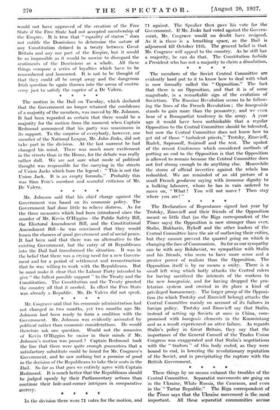The members of the Soviet Central Committee are evidently hard
put to it to know how to deal with what is now formally called the " Opposition:" The fact that there is an Opposition, and that it is of some magnitude, a remarkable sign of the evolution of Sovietism. The Russian Revolution seems to be follow- ing the lines of the French Revolution ; the bourgeoisie stands to gain more than the peasantry, and we even hear of a Bonapartist tendency in the army. A year ago it would have been unthinkable that a regular Opposition to the Central Committee should be tolerated, but now the Central Committee does not know how to get rid of those " turbulent priests," Trotsky, Zinovieff, Radek, Sapronoff, Smithoff and the rest. The upshot of the recent Conference which considered methods of putting an end to the Opposition is that the Opposition is allowed to remain because the Central Committee does not feel strong enough to do anything else. Meanwhile the storm of official invective against the rebels has redoubled. We are reminded of an old picture of a small French gendarme saying with immense dignity to a hulking labourer, whom he has in vain ordered to move on, " What ! You will not move ? Then stay where you are ! " * *


































 Previous page
Previous page